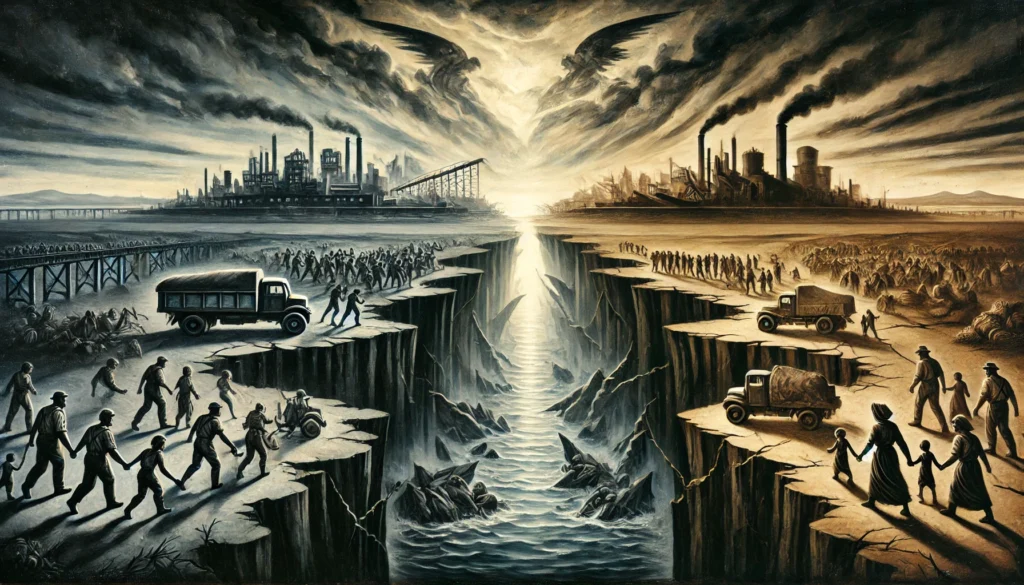In a world filled with political turmoil and ideological clashes, one question continues to resonate loudly: “Why are people voting for Trump?” The answer to this question goes beyond mere political affiliation; it delves into the deep-rooted frustrations that many Americans are experiencing with their quality of life. Are they truly willing to put a dictator into power, or is there more to the story?
There’s a pervasive notion of a shadow government and an elite ruling the country, allegedly making things worse for everyday Americans. But is this really the crux of the issue? To unravel this mystery, we need to explore the dynamics of corporate greed, Republican support for it, and the perceived threat of “socialist” Democrats.
The Alleged Shadow Government
The concept of a shadow government, often associated with conspiracy theories, suggests that there is a clandestine group of individuals manipulating the country’s fate from behind the scenes. While such theories have gained traction among certain segments of the population, it’s essential to critically evaluate their validity.
Conspiracies aside, there is no denying that the power and influence of certain elites can shape government policies and decisions. Lobbying, campaign donations, and corporate interests often play a significant role in shaping the political landscape. However, attributing all of society’s problems to a secretive cabal oversimplifies the complexity of our issues.
The Role of Corporate Greed

To get to the heart of the matter, we must recognize the corrosive influence of corporate greed on our society. It’s not a shadow government but rather a visible and potent force that has infected every aspect of our lives. The pursuit of profit at all costs has led to the erosion of workers’ rights, environmental degradation, and income inequality.
Republicans have been staunch supporters of this corporate greed movement, advocating for deregulation and tax cuts that disproportionately benefit the top 1% who control a substantial portion of our nation’s wealth. This alliance has left the middle class at a disadvantage, struggling to make ends meet while the wealthy continue to accumulate riches.
The Trump and Republican Movement
The Trump and Republican movement has managed to convince a significant portion of the population that it’s not corporate greed that’s at the root of our nation’s problems, but rather the “socialist” Democrats who aim to expand the government’s role in our lives. This narrative has been a potent tool in rallying support for policies that favor the wealthy elite.
While Trump’s tenure as president was marked by a focus on deregulation and tax cuts, it’s essential to acknowledge the underlying messaging that resonated with many Americans. His promise to “Make America Great Again” tapped into the frustrations of those who felt left behind by globalization and economic policies that favored big corporations.
The Battle of Ideologies

At the heart of the political divide lies a battle of ideologies. On one side, there are those who believe that limited government intervention and a laissez-faire approach to the economy will lead to prosperity for all. On the other side, there are advocates for a more robust social safety net and government intervention to address systemic inequalities.
The fear of “socialism” often raised by Trump and his supporters reflects a genuine concern about the potential consequences of an expanded government role. However, it’s crucial to distinguish between democratic socialism, which seeks to address social and economic disparities through democratic means, and authoritarian socialism, which threatens individual liberties.
Bridging the Divide
To move forward as a nation, we must bridge this ideological divide and address the real issues facing our society. Corporate greed is not a conspiracy theory but a tangible force that has shaped our world. Rather than blaming “woke” mobs or secretive elites, we should focus on holding corporations accountable for their actions.
This can be achieved through a combination of regulatory reforms, fair taxation, and an emphasis on workers’ rights. Efforts to create a more equitable society should not be seen as a threat but as a path towards a better future for all Americans.
Conclusion
The question of why people vote for Trump goes beyond surface-level political preferences. It delves into the frustrations and anxieties that many Americans feel about the state of their lives. While the concept of a shadow government and an elite ruling the country may capture imaginations, it’s the very real issue of corporate greed that we must confront.
Republicans have aligned themselves with corporate interests, perpetuating economic inequalities. The Trump movement has successfully framed the debate as one between capitalism and socialism, but it’s essential to recognize the nuances within these ideologies.
In our pursuit of a more equitable society, we must prioritize the well-being of all citizens and work towards holding corporations accountable for their actions. Only then can we hope to bridge the ideological divide and create a better future for America.



